Trajectories and political ecology in the evaluation of public policies:
expanding the proposal for in-depth evaluation
DOI:
https://doi.org/10.36517/aval.v11i25.95394Keywords:
Environment, Public policy, Evaluation, Participation, In-depth evaluationAbstract
The proposal of integration between political ecology — differentials of power and interests, actors and environments (Little, 2006 — and in-depth evaluation — content, contexts, institutional and spatial-territorial trajectory (Rodrigues, 2008, 2019) —, we use the notion of trajectory as a theoretical-methodological strategy to expand the research agenda of Policy Science, weighing the sense of evaluating the "State in action" from the element that precedes the implementation of the Policy/Programme: the institution. In the theoretical sphere, we emphasize hermeneutic anthropology, while in the analytical sphere we take as an empirical locus an analytical exercise carried out according to the aforementioned proposal (Lima, 2023). Through the study of a particular manifestation of decentralized environmental policy, we show how the notion of trajectory contributes to the evaluation of public policies and to the making of broader and more meaningful inferences. We conclude by addressing the contribution of the proposal to the production of useful knowledge for social improvement and participatory democracy.
Downloads
References
Não se aplica.
Downloads
Published
How to Cite
Issue
Section
License
Copyright (c) 2025 Revista Aval

This work is licensed under a Creative Commons Attribution-NonCommercial 4.0 International License.


